The focus on cryptography in radio serials during Johnson’s childhood reflected the climate of fear and suspicion of the WWII and the Cold War period. Long before the infamous witch-hunt of Senator McCarthy, a feeling of uncertainty caused citizens to be suspicious of everyone around them. Communism was felt to be the largest threat to national security but it took very little political conviction to earn a spot on one of the blacklists or a FBI file. Homosexuals (or “sexual deviants” to use the term of the time) were one of the key groups targeted. Senator McCarthy was certain that homosexuals were likely to be spies because of their susceptibility to blackmail in order to hide what he saw as their “perversion.” Gays were expunged from the government as well as from many private companies. Right wing stumpers depicted homosexuality as “an epidemic infecting the nation, actively spread by Communists to sap the strength of the next generation.”14
The repercussions of this sentiment played out in all areas of life. In the name of national security, post offices turned over to the police the names of those receiving suspicious mail such as gay-targeted magazines. Inspectors also baited gays by joining pen pal clubs often used by homosexuals to meet one another. If the posers found “proof” of someone’s homosexuality, they traced the victim’s mail to identify others.15 In the midst of this homophobic climate Johnson struggled with his sexuality, seeking answers first in Christian Science and then Jungian psychology. His use of the postal system for the NYCS mocks the type of surveillance prevalent at the time by continually confusing the distinction between public and private, as well as the roles of author, middleman and recipient. Tracing Johnson’s mail would have been a full time job. Whether or not Johnson’s intentions in forming the NYCS were at all political, he could not have been immune to the cultural angst. Historians Claire A. Culleton and Karen Leick stress the importance of remembering that, “the [FBI]’s oppressive measures and its continuous surveillance were part and parcel of writers’ and artists’ everyday lives during these years. As such, the culture of American modernism was irrevocably charged with paranoia, censorship, and equivocation.”16
________________________________________________________
14 Kathy Peiss, Christina Simmons and Robert A. Padgug, eds., Passion and Power: Sexuality in History (Philadelphia: Temple University Press, 1989), 228, 233.
15 Ibid., 230.
16 Claire A. Culleton and Karen Leick, ed. Modernism of File: Writers, Artists, and the FBI, 1920-1950
(New York: Palgrave Macmillan, 2008), 17.
skip to main |
skip to sidebar

+copy.jpg)
Ray Johnson, James Dean/Rimbaud, collage on cardboard, ca. 1956-58, 11 by 7.625 inches, Private Collection

Tesserae 2, 1962 (William S Wilson)
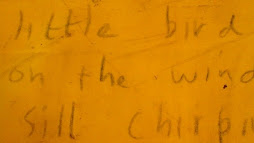
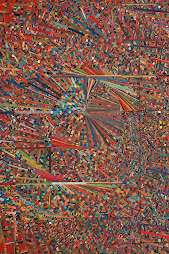
Collection of William S. Wilson



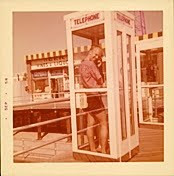
(Estate of Frances X. Profumo)
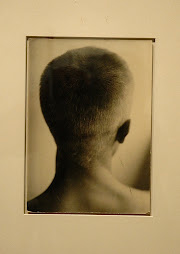
Hazel Larsen Archer (Collection of William S. Wilson and John Wronowski)
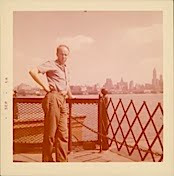
(Estate of Frances X. Profumo)
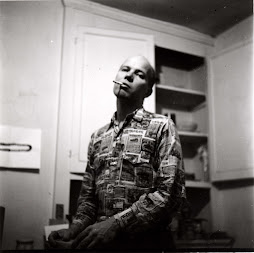
Photo by Marie T. Stilkind


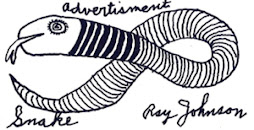

A Blog for the Exhibition, From BMC to NYC: The Tutelary Years of Ray Johnson (1943-1967) Black Mountain College Museum + Arts Center, Asheville NC
February 19th - June 12th, 2010
Ray Johnson piece at Blackbird Journal
Go online to www.blackbird.vcu.edu/
in the Gallery section
to read about the recent Ray Johnson show
held last spring at the Black Mountain College Museum + Arts Center

All work of Ray Johnson on this site is used by permission of The Ray Johnson Estate
+copy.jpg)
Ray Johnson, James Dean/Rimbaud, collage on cardboard, ca. 1956-58, 11 by 7.625 inches, Private Collection
Detail from a Ray "Tesserae"

Tesserae 2, 1962 (William S Wilson)
Mat Fragment

Detail of Ladder Whirled (1952)

Collection of William S. Wilson
Links
- Asheville Vaudeville
- Barbara Cushman.com
- Black Mountain College Museum + Arts Center
- Charles Farrell, Collage
- Conversation with Ray
- Early Ray Johnson Interview in Detroit
- Essay on Ray by Mark Bloch
- Lauren LaRocca's article on Write Soon, Goon
- Merz Pictures
- Poetix Vanguard
- Raleigh Rambles
- Ray Bibliography
- Ray Exhibition from 1999, Review
- Ray Johnson - Educator
- Ray Johnson Estate
- Rayocide--67 Paragraphs on the Death of Ray Johnson
- Stealing Experience: A Collaboration in Friendship
- William S. Wilson on Ray's NYCS
MOTICOS, Shot by Avery the Imp

a Bunny Chart

Blog Archive
-
▼
2010
(139)
-
▼
January
(24)
- Just One of the Many Ray Johnson Pieces You've Nev...
- Rough Draft of Card # 5
- Krista Franklin Coming in February to Give Collage...
- Visual Poetry Workshop, February 27th at BMCM+AC
- Chicago-based Poet and Collagist, Krista Franklin
- Stay Tuned!!
- Ha Ha
- Early Altered Postcard
- from Code Word: Ray, by Kate Erin Dempsey
- Ray's Code
- Outtake from "Message(s) in a Bottle: Notes of an ...
- What is a Moticos?
- Decoder Ring
- Opening of Kate Erin Dempsey's "Code Word: Ray"
- Draft of Exhibition Poster
- Ray Mask
- "Negroes, Churches, Stars"
- Brief Excerpt from: Notes of an Unlikely Curator, ...
- Elegy for Ray
- A Peek at "Notes of an Unlikely Curator"
- Oedipus (Elvis 1), Ray Johnson
- No title
- "To Kate"
- Outtake from "Message in a Bottle: An Intro," on K...
-
▼
January
(24)
Ray's Mouth, Close Up of Archer Photo

Ray in Booth

(Estate of Frances X. Profumo)
Back of Ray's Head

Hazel Larsen Archer (Collection of William S. Wilson and John Wronowski)
Ray on Ferry

(Estate of Frances X. Profumo)
Ray in NYC Apartment

Photo by Marie T. Stilkind
detail from "Ha Ha," Collection William S. Wilson

BMC sandals


